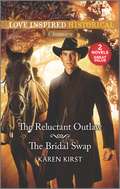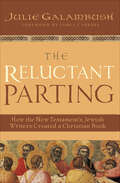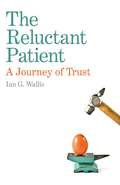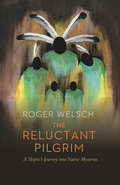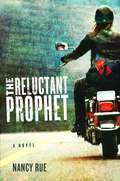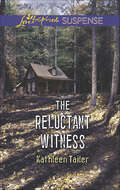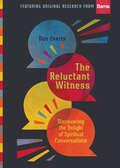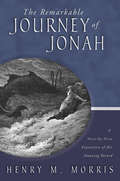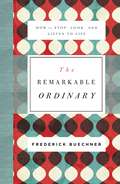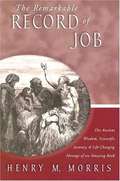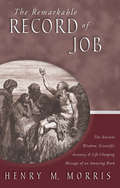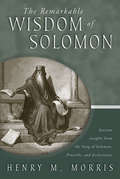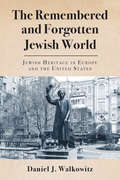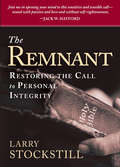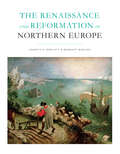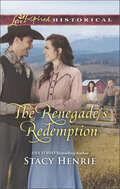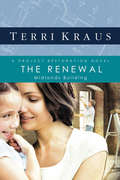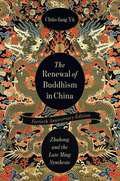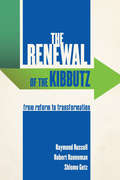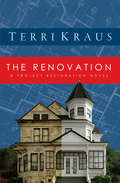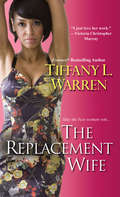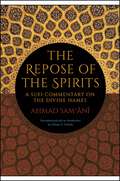- Table View
- List View
The Reluctant Outlaw & The Bridal Swap
by Karen KirstDreams of home and family in the Smoky MountainsThe Reluctant OutlawEvan Harrison has risked everything to find the men who killed his brother. Saving Juliana O’Malley on a perilous journey through the Smoky Mountains could blow his cover with the deadly gang. Yet her courage and faith make him dream of the home and family he thought he could never have. And suddenly, that future is incomplete—without Juliana in it.The Bridal SwapThe heiress Josh O’Malley has courted by mail is on her way to Gatlinburg, Tennessee, to become his wife. Together, they’ll create the family of his dreams. But when the stagecoach arrives, it’s not his intended who exits, but her sister! Kate came to end her sister’s engagement, but now she’s in no hurry to leave. If only Josh would realize that his dream can still come true…
The Reluctant Outlaw (Smoky Mountain Matches)
by Karen KirstA Tennessee woman is swept off her feet by a mysterious outlaw in this exciting and uplifting historical Western romance.Tennessee, 1880. The ruthless stranger who takes Juliana O’Malley hostage is a thief and an outlaw—or so she thinks. But on a perilous journey through the Smoky Mountains, he becomes her unlikely protector. And when he pledges to return her home safely, she somehow finds herself believing him.Evan Harrison has risked everything to find the men who killed his brother. Saving spirited, strong-willed Juliana could blow his cover with a deadly gang. Yet her courage and unwavering faith make him dream of the home and family he thought he could never have. And suddenly, that future is incomplete . . . without Juliana in it.
The Reluctant Parting: How the New Testament's Jewish Writers Created a Christian Book
by Julie GalambushDiscover the New Testament’s Forgotten Jewish Origins
The Reluctant Patient: A Journey of Trust
by Ian G. WallisIllness tends to be viewed in a negative light as something to be avoided at all costs. Yet most of us become ill at some point and many will suffer prolonged periods of failing health. In this insightful and entertaining book, Ian invites us to accompany him through one such experience and to discover how, despite its debilitating effects, illness can yield a deeper appreciation of living as well as of those who share our journeys. Here is an honest, amusing and, at times, profound account, full of wisdom, humanity and faith.
The Reluctant Pilgrim: A Skeptic's Journey into Native Mysteries
by Roger L. WelschForty years ago, while paging through a book sent as an unexpected gift from a friend, Roger Welsch came across a curious reference to stones that were round, “like the sun and moon.” According to Tatonka-ohitka, Brave Buffalo (Sioux), these stones were sacred. “I make my request of the stones and they are my intercessors,” Brave Buffalo explained. Moments later, another friend appeared at Welsch’s door bearing yet another unusual gift: a perfectly round white stone found on top of a mesa in Colorado. So began Welsch’s lesson from stones, gifts that always presented themselves unexpectedly: during a walk, set aside in an antique store, and in the mail from complete strangers. The Reluctant Pilgrim shares a skeptic’s spiritual journey from his Lutheran upbringing to the Native sensibilities of his adoptive families in both the Omaha and Pawnee tribes. Beginning with those round stones, increasing encounters during his life prompted Welsch to confront a new way of learning and teaching as he was drawn inexorably into another world. Confronting mainstream contemporary culture’s tendency to dismiss the magical, mystical, and unexplained, Welsch shares his personal experiences and celebrates the fact that even in our scientific world, “Something Is Going On,” just beyond our ken.
The Reluctant Prophet
by Nancy RueForty-something Allison Chamberlain is still halfheartedly trying to figure out what to be when she grows up. It's a surprise to everyone when she feels a divine nudge to buy a Harley motorcycle and go wherever it takes her. Soon Allison finds herself in the darkest corners of society, bringing home drug addicted prostitutes and pointing out the narrow fears of her church group. Along the way, she learns the heartache of the very poor and how healing can come through the voice of God and those who follow it.
The Reluctant Rancher: An Uplifting Inspirational Romance (Lone Star Heritage)
by Jolene NavarroWill his childhood nemesis be the second chance he needs? Despite the mess FBI agent Enzo Flores has made of his life, he&’s still eager to help others—like his sister, Ana. But coming home to Texas to run the family ranch and take care of his nephew might be more than Enzo can handle. He enlists the help of Ana&’s best friend, Resa Espinoza, who&’s always been good at riling him up. This time, she might just help him heal…From Love Inspired: Uplifting stories of faith, forgiveness and hope.Lone Star Heritage
The Reluctant Witness
by Kathleen TailerLEFT FOR DEAD When his partner turns on him and tries to kill him, FBI agent Jack Mitchell is framed for murder and abandoned...until a blue-eyed beauty saves his life. Even in his wounded haze Jack sees Casey Johnson is hiding a secret. As the only witness to his innocence, Jack needs her. But Casey doesn't know who's more dangerous-the man who wants Jack dead or the handsome agent himself. For if Jack knew the reason she escaped to the wilderness with her niece, he'd have to arrest her. But on the run with Jack, Casey realizes that more than her secret is at stake now. So is her heart....
The Reluctant Witness: Discovering the Delight of Spiritual Conversations (Lutheran Hour Ministries Resources)
by Don EvertsNew research finds that Christians are less involved in spiritual conversations today than we were twenty-five years ago. As society has changed, it seems we have become more uncomfortable talking with people about our faith. We are reluctant conversationalists. The reality is that many of our churches and communities are shrinking instead of growing. What can we do about this? Don Everts, himself a reluctant witness, grew up assuming that spiritual conversations are always painful and awkward. But after falling into one spiritual conversation after another, he was surprised to discover that they aren't. Don's surprising—and sometimes embarrassing—stories affirm what Scripture and the latest research reveal: spiritual conversations can actually be a delight. Unpacking what God's Word says about spiritual conversations and digging into the habits of eager conversationalists, Everts describes what we can learn from Christians who are still talking about their faith. With original research from the Barna Group and Lutheran Hour Ministries on spiritual conversations in the digital age, this book offers fresh insights and best practices for fruitful everyday conversations.
The Remarkable Journey of Jonah: A Scholarly, Conservative Study of His Amazing Record
by Dr Henry M. MorrisA Raging storm, a rebellious prophet, and somewhere out there, a great fish? This book is a fascinating commentary on the life of the great prophet: Could a man spend three days inside a huge fish? His prayer of deliverance Why did he run from God? The influence of the ancient city, Nineveh Jonah and the twenty-first century The late scholar and author Dr. Henry Morris believed the biblical account of Jonah was true, and this book will thrill others who believe it, too. Drawing on a lengthy research career, Morris takes the reader on the same wonderful ride on which Jonah embarked. Sure to be a hit for Bible study groups and individuals who find inspiration from a beloved classic. Henry Morris, Ph.D., (deceased) earned the title, "The Father of Modern Creationism," through with his numerous writings about the creation/evolution debate. He was a respected scientist and wrote, textbook author and the founder of the Institute for Creation Research in California.
The Remarkable Ordinary: How to Stop, Look, and Listen to Life
by Frederick BuechnerYour remarkable life is happening right here, right now. You may not be able to see it – your life may seem predictable and your work insignificant until you look at your life as Frederick Buechner does.Based on a series of mostly unpublished lectures, Frederick Buechner reveals how to stop, look, and listen to your life. He reflects on how both art and faith teach us how to pay attention to the remarkableness right in front of us, to watch for the greatness in the ordinary, and to use our imaginations to see the greatness in others and love them well.As you learn to listen to your life and what God is doing in it, you will uncover the plot of your life’s story and the sacred opportunity to connect with the Divine in each moment.
The Remarkable Record of Job
by Henry M. MorrisThe ancient wisdom, scientific accuracy and life-changing message of an amazing book.
The Remarkable Record of Job: The Ancient Wisdom, Scientific Accuracy, & Life-Changing Message of an Amazing Book
by Dr. Henry M. MorrisFar from being an engaging fable, the account of Job in the bible is one of the most historically and scientifically accurate records of the ancient world. Perhaps the oldest book in the Bible, the book of Job touches on many subjects of science and history. This commentary on the controversial Book of Job is very different from most of the seminary and church teachings so prevalent today, for it attests to the historicity of a man named Job who understood at the end of his life that God cannot be ?figured out,? but He can most certainly be trusted.
The Remarkable Wisdom of Solomon: Ancient insights from the Song of Solomon, Proverbs, and Ecclesiastes
by Dr Henry M. MorrisAfter the birth of the Jewish nation, but before the brutal string of invading Pagan armies, there arose an Israel a king whose splendor was so rich, his very name is still spoken with awe: Solomon. Inheriting and expanding a magnificent kingdom from his father, King David, Solomon, attained both spiritual and material wealth, confounding his enemies and thrilling his own people. The Bible claims there will never be another like him. His legacy includes three canonical works that flowed from God to his pen - Proverbs, Ecclesiastes, and Song of Solomon. Strangely, these three books are rarely examined by modern scholars, but longtime author and defender of the faith, the late Henry Morris, provided an invaluable commentary. His examination of Solomon's life, and the insights into the writings themselves, give the Bible student a worthy tour through the life of a most remarkable man. 240 pages * 5 1/2 x 8 1/2 * Trade paper
The Remembered and Forgotten Jewish World: Jewish Heritage in Europe and the United States
by Daniel J. WalkowitzIn the late nineteenth and early twentieth centuries, the Jewish socialist movement played a vital role in protecting workers’ rights throughout Europe and the Americas. Yet few traces of this movement or its accomplishments have been preserved or memorialized in Jewish heritage sites. The Remembered and Forgotten Jewish World investigates the politics of heritage tourism and collective memory. In an account that is part travelogue, part social history, and part family saga, acclaimed historian Daniel J. Walkowitz visits key Jewish museums and heritage sites from Berlin to Belgrade, from Krakow to Kiev, and from Warsaw to New York, to discover which stories of the Jewish experience are told and which are silenced. As he travels to thirteen different locations, participates in tours, displays, and public programs, and gleans insight from local historians, he juxtaposes the historical record with the stories presented in heritage tourism. What he finds raises provocative questions about the heritage tourism industry and its role in determining how we perceive Jewish history and identity. This book offers a unique perspective on the importance of collective memory and the dangers of collective forgetting.
The Remnant: On the Brink of Armageddon (Left Behind No. #10)
by Tim Lahaye Jerry B. JenkinsThose who have become Christians after the Rapture witness new miracles as Carpathia intensifies his reign of terror and the Jews gather in Petra.
The Remnant: Restoring Integrity to American Ministry
by Larry StockstillGod is issuing a call to bring integrity back to American Christianity. The foundational truths in this book will show the way. In this book Larry Stockstill challenges readers with principles for turning our nation around to integrity and commitment and precluding the judgment of God. There is a new breed of pastors and laypeople who are asking the tough questions: * Where has the glory of God gone in the American church? * When did the simple, pure gospel of the Savior become about "me," "my," and "mine"? * What happened to the transparency and integrity that marked the church for centuries? To each reader God is saying, "I want to start with you." Allow this book to shake you to the core and reorganize your family, your ministry, and your future.
The Renaissance and Reformation in Northern Europe
by Margaret McGlynn Kenneth R. BartlettThis updated version of Humanism and the Northern Renaissance now includes over 60 documents exploring humanist and Renaissance ideals, the zeal of religion, and the wealth of the new world. Together, the sources illuminate the chaos and brilliance of the historical period—as well as its failures and inconsistencies. The reader has been thoroughly revised to meet the needs of the undergraduate classroom. Over 30 historical documents have been added, including material by Martin Luther, John Calvin, John Knox, William Shakespeare, Christopher Columbus, Miguel de Cervantes, and Galileo Galilei. In the introduction, Bartlett and McGlynn identify humanism as the central expression of the European Renaissance and explain how this idea migrated from Italy to northern Europe. The editors also emphasize the role of the church and Christianity in northern Europe and detail the events leading up to the Reformation. A short essay on how to read historical documents is included. Each reading is preceded by a short introduction and ancillary materials can be found on UTP's History Matters website (www.utphistorymatters.com).
The Renegade's Redemption
by Stacy HenrieRefuge for the OutlawWhen Tex Beckett arrives at Ravena Reid’s farm, he’s eight years too late for the elopement they’d once planned—and it’s far too early to win her forgiveness. He’s seriously wounded, though, and she can’t turn him away, though she knows better than to trust him. Yes, it’s wonderful having help with the farm, and with the orphans she fosters, but if she opens her heart, she’ll get hurt again when he leaves. And Tex always leaves.As a notorious bank robber, Tex is used to danger. Yet reuniting with the only woman he’s ever loved is the riskiest thing he’s ever done. All he wants is to stay with Ravena and the children. But can he build a new start before his past catches up with him?
The Renewal
by Terri KrausLeslie Ruskin has just purchased the historic Midlands Building, which--like her life--needs a little renovation. Starting over in a new town after a devastating divorce, Leslie wants a fresh start--and some stability for her five-year-old daughter. Still, standing on the sidewalk looking up at the seedy brownstone in Butler, Pennsylvania's reviving downtown, she wonders if she's done the right thing. Her plan is to live in one of the building's second-floor apartments, and rent out the first floor--a large commercial space with stunning architectural details that was once a locksmith's shop. But it needs work. A lot of work.Jack Kenyon, a master carpenter, is starting over too. Beginning his own construction business, he seems to be the perfect man for the project, especially with his experience in historic restoration. But haunted by loneliness, his past failures, and the lost relationship with his own young daughter, Jack finds it difficult to maintain his sobriety.As Leslie struggles to manage as a single mom, the work begins--and she's intrigued when the renovation exposes a mystery in the old locksmith shop. Even more exciting, she rents the area to a chic young couple who are experienced restaurateurs. As the run-down first floor is transformed into a vibrant café/bistro, Jack and Leslie discover an attraction that might become more than a business relationship ... and Jack's old demons begin to surface. Will the whole project derail--or will they find the renewal their lives so desperately need?
The Renewal of Buddhism in China: Zhuhong and the Late Ming Synthesis (The Sheng Yen Series in Chinese Buddhist Studies)
by Chün-fang YüFirst published in 1981, The Renewal of Buddhism in China broke new ground in the study of Chinese Buddhism. An interdisciplinary study of a Buddhist master and reformer in late Ming China, it challenged the conventional view that Buddhism had reached its height under the Tang dynasty (618–907) and steadily declined afterward.Chün-fang Yü details how in sixteenth-century China, Buddhism entered a period of revitalization due in large part to a cohort of innovative monks who sought to transcend sectarian rivalries and doctrinal specialization. She examines the life, work, and teaching of one of the most important of these monks, Zhuhong (1535–1615), a charismatic teacher of lay Buddhists and a successful reformer of monastic Buddhism. Zhuhong’s contributions demonstrate that the late Ming was one of the most creative periods in Chinese intellectual and religious history. Weaving together diverse sources—scriptures, dynastic history, Buddhist chronicles, monks’ biographies, letters, ritual manuals, legal codes, and literature—Yü grounds Buddhism in the reality of Ming society, highlighting distinctive lay Buddhist practices to provide a vivid portrait of lived religion.Since the book was published four decades ago, many have written on the diversity of Buddhist beliefs and practices in the centuries before and after Zhuhong’s time, yet The Renewal of Buddhism in China remains a crucial touchstone for all scholarship on post-Tang Buddhism. This fortieth anniversary edition features updated transliteration, a foreword by Daniel B. Stevenson, and an updated introduction by the author speaking to the ongoing relevance of this classic work.
The Renewal of the Kibbutz
by Shlomo Getz Raymond Russell Robert HannemanWe think of the kibbutz as a place for communal living and working. Members work, reside, and eat together, and share income "from each according to ability, to each according to need." But in the late 1980s the kibbutzim decided that they needed to change. Reforms--moderate at first--were put in place. Members could work outside of the organization, but wages went to the collective. Apartments could be expanded, but housing remained kibbutz-owned. In 1995, change accelerated. Kibbutzim began to pay salaries based on the market value of a member's work. As a result of such changes, the "renewed" kibbutz emerged. By 2010, 75 percent of Israel's 248 non-religious kibbutzim fit into this new category. This book explores the waves of reforms since 1990. Looking through the lens of organizational theories that predict how open or closed a group will be to change, the authors find that less successful kibbutzim were most receptive to reform, and reforms then spread through imitation from the economically weaker kibbutzim to the strong.
The Renovation
by Terri KrausEthan Willis has made a career out of restoring old houses like the Carter Mansion so he's an expert with doors and windows. He knows his way around a toolbox, a construction site, and anything else having to do with rebuilding. If only he could do the same with his own life. Tragically widowed and left with a young son, he's done the best he could, but now that Chase has become a teenager that best somehow isn't quite good enough.For his part, Chase doesn't know what he'd do without baseball, his best friend Elliott and the secret hideaway even his dad doesn't know about. What he does know is that the reporter lady who suddenly started chatting with his dad can't be a good thing.In a small town where everyone knows everything, does an outsider--a young, cute, ambitious reporter-kind-of-outsider like Cameron Dane--even have a prayer of getting to know the handsome but moody builder? Does it matter that they both hold secrets from their pasts? And can Chase ever be freed from the hidden guilt of his mother's death? Only time, and a special kind of patience, will tell.
The Replacement Wife
by Tiffany L. Warren"I just love her work." --Victoria Christopher Murray Atlanta's most eligible widower isn't looking to remarry--but for one woman, that's a mere detail...Five years after his beloved wife's death, wealthy Quentin Chambers still hasn't returned to the church or his music ministry. Even his home is now devoid of music, and without his attention, Quentin's five children are out of control--until his mother steps in and hires him a live-in nanny. Montana is pretty, compassionate, church-going, and even has a beautiful singing voice. The children take to her right away, and soon Quentin finds his heart opening to faith--and love--once more. But not everyone loves Montana...A "friend" of Quentin's first wife, Chloe has been scheming to become the next Mrs. Chambers since the funeral. Now she'll do whatever it takes to get rid of Montana--including blackmail, theft--and digging up a troublemaking man from Montana's past. But Chloe's got secrets of her own, and the tables may turn with a twist she never sees coming..."When I read a Tiffany L. Warren novel I know I'm going to get two things--a riveting story that will leave me speechless and a faith boost!" --ReShonda Tate Billingsley"Strong messages about the power of faith, church, and prayer carry this rags-to-riches romance with a definite fairy tale vibe." --Library Journal
The Repose of the Spirits: A Sufi Commentary on the Divine Names (SUNY series in Islam)
by Ahmad Sam'ānīThe Repose of the Spirits is a translation of one of the earliest and most comprehensive treatises on Sufism in the Persian language. Written by Aḥmad Sam'ānī, an expert in Islamic law from a famous Central Asian scholarly family in about the year 1135, it is one of the handful of early Sufi texts available in English and is by far the most accessible. It also may well be the longest and the most accurately translated. Ostensibly a commentary on the divine names, it avoids the abstract discourse of theological nitpicking and explains the human significance of the names with a delightful mix of Quranic verses and sayings of the Prophet and various past teachers, interspersed with original interpretations of the received wisdom. Unlike the usual books on the divine names (such as that of al-Ghazali), The Repose of the Spirits reminds the reader of the later poetical tradition, especially the work of Rumi. The prose is richly embroidered with imagery and interspersed with a great variety of Arabic and Persian poetry. What is especially remarkable is the manner in which the author speaks to his readers about their own personal situations, explaining why they are driven by a love affair with God, a God who is full of compassion and good humor, whether they know it or not. William C. Chittick's masterful new translation brings this work to an English-language audience for the first time.
